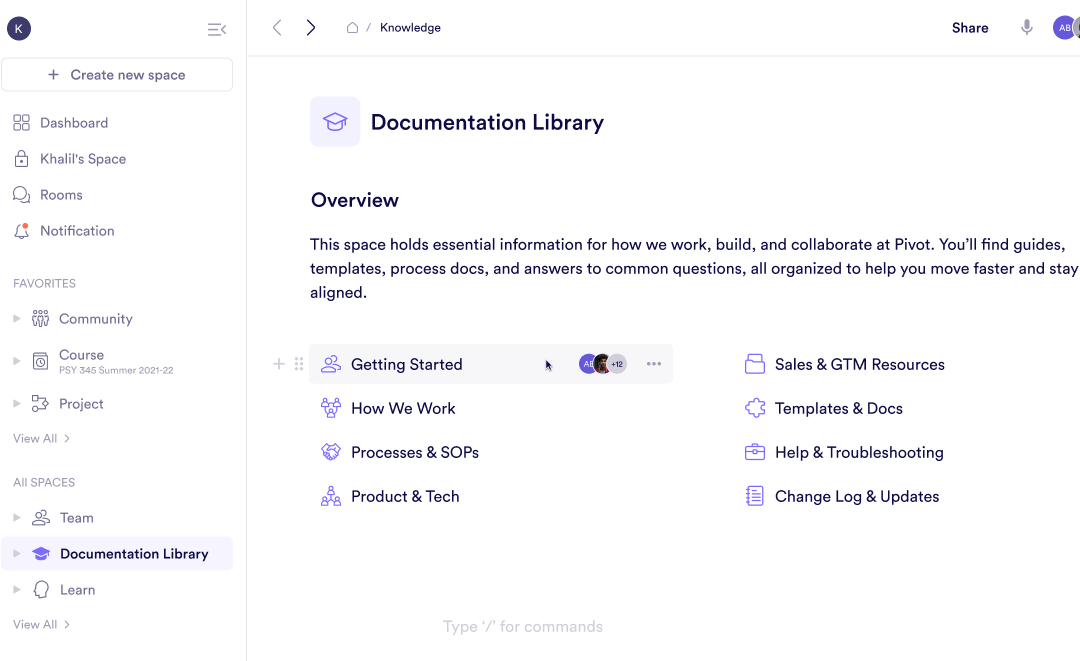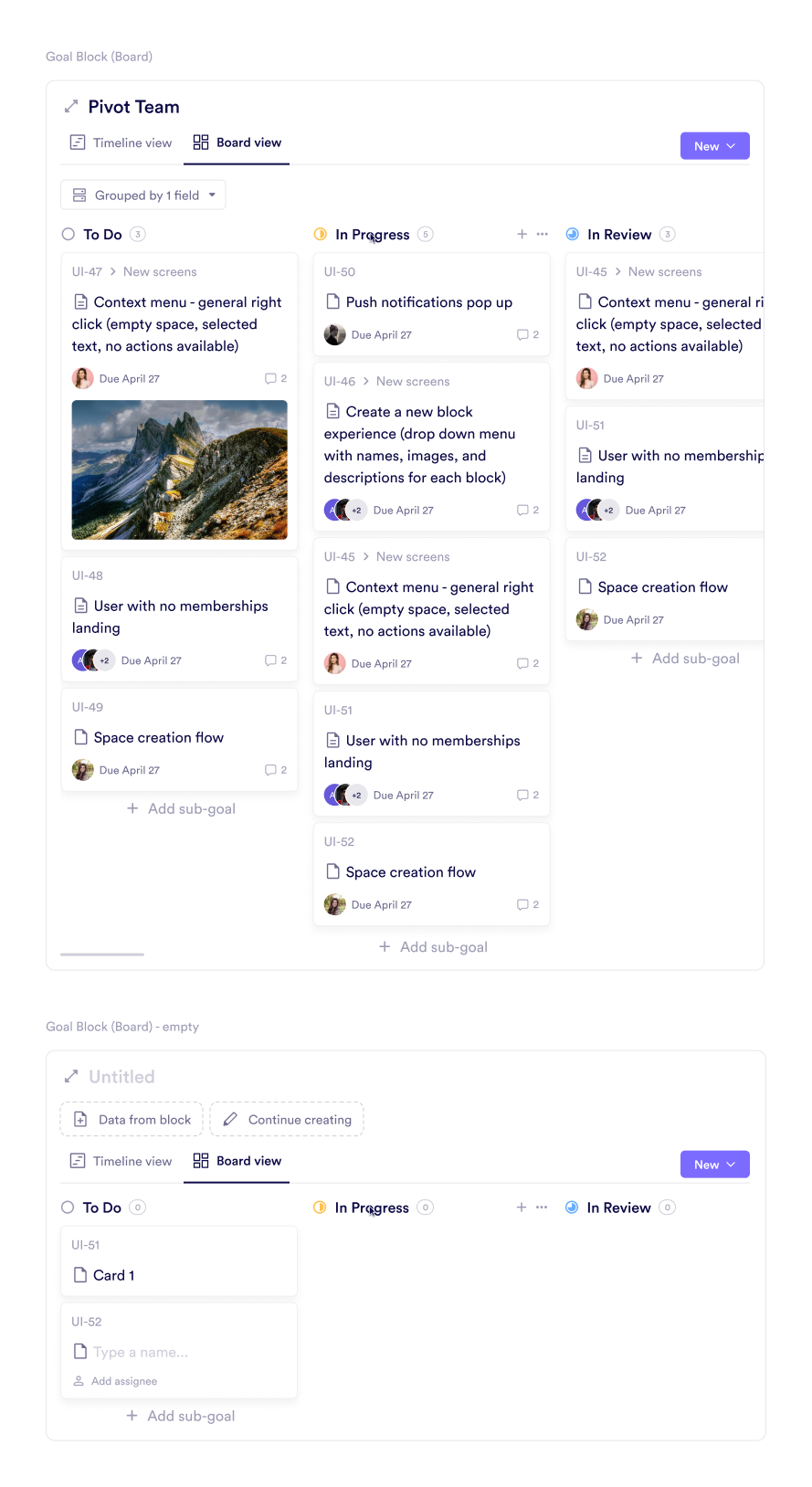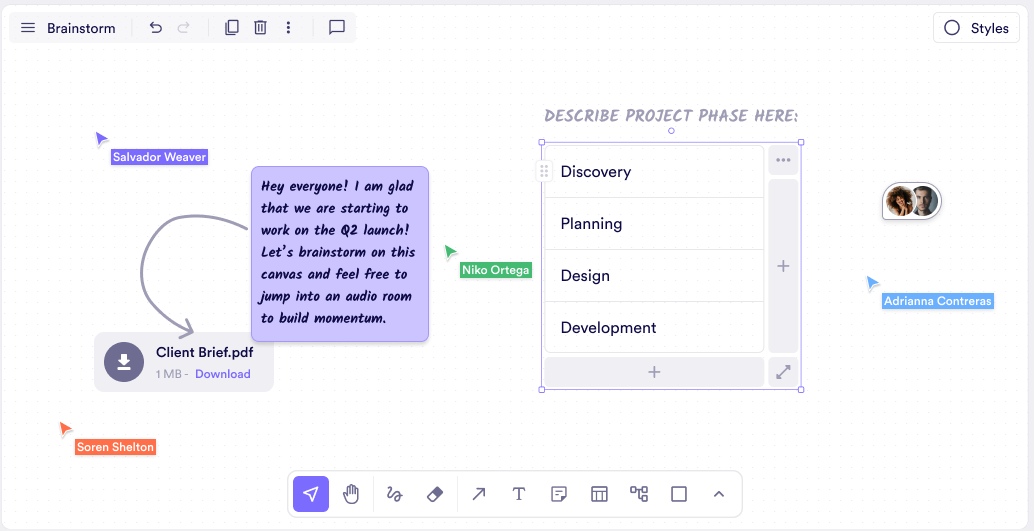High Performance Team
Create a space where teams can excel with Pivot. Organize tasks, align objectives, and foster collaboration using spaces, rooms, infinite canvases, and more. Track progress with analytics, refine plans as needed, and celebrate milestones to keep your team motivated and productive with a team collaboration tool that supports both real-time and async work.

A high performance team rarely relies on chance; it relies on rhythm, shared vocabulary, and a place built for the work at hand. Give people a hub where plans live beside conversations, where ownership is obvious, and where progress is visible without a status parade. Pivot brings those pieces together in one work platform: you open spaces for your groups, write the work on pages, gather decisions in post rooms, resolve blockers in chat rooms, shape ideas on infinite canvases, and watch patterns in space analytics so the next week runs smarter than the last.
Create a Team Communication Hub That Scales
Begin with a dedicated space for each team or initiative. Inside the space, lay down a navigation page that links to briefs, SOPs, sprint plans, and the living backlog. Add roles so leads can edit, reviewers can comment, and stakeholders can read without tripping over configuration. Pair that structure with two always-on channels: a post room for written updates and decisions, and a chat room for quick questions that do not warrant a meeting.
This combination turns Pivot into a practical center for team communication. Updates are readable, questions are traceable, and the work artifact remains the reference point. If your group spans time zones, this hub supports async communication by default, which means no one waits on a calendar to keep moving.

Define Objectives and Team Productivity Metrics
Clarity attracts momentum. Use goal blocks to write the objective in plain language, list two or three signals that prove movement, and tag owners. Embed the block at the top of your sprint page and mirror it on the team homepage so the same target appears where people plan and where they check in.
For example, a product team might track sign-up success rate, time to first value, and support tickets per active user. A marketing team might use qualified demo requests, content-to-lead conversion, and partner referrals. Because goal blocks live alongside your plans, you get team productivity cues without bolting on a separate dashboard.

Run Fast Decisions With Team Collaboration Tools
Written-first habits shorten meetings and sharpen outcomes. When a choice appears, open a thread in the post room with a tight summary, options, and criteria. Invite comments for a set window, then attach a poll to close the loop. If a topic needs tone or a sketch, jump into a video room or audio room, record the call, and clip the exact two minutes that matter. Pin the clip under the thread and log the result on the project page’s Decision section.
Day to day, this pattern puts your team collaboration tools to work: context arrives in writing, voice is used sparingly and well, and the record lives where future readers will look first.
Map Strategy on an Infinite Canvas
Some plans breathe better when you can see them spread out. Open an infinite canvas to draft a launch map, a hiring plan, or a quarterly roadmap. Place swimlanes by workstream, drop cards for milestones, add lightweight blockers, and link each card back to its page. Invite the group to edit live or contribute asynchronously. Because canvases sit inside your space, the visual plan remains part of the same work app rather than floating in a slide deck that no one updates.

Operate Across Time Zones With Async Work
Distributed teams gain speed when handoffs are predictable. Publish a “follow-the-sun” page with a simple table: current focus, next step, risk, owner, and the link to the working page. Ask each region to update before signing off. Keep the chat room focused on time-sensitive pings and end every thread with a one-line outcome. Use the post room for weekly progress notes that anyone can scan in minutes.
Pair these rituals with live document editing so reviewers can annotate a spec while the author sleeps. This is async work in practice: fewer meetings, tighter writing, and a history that newcomers can learn from.
Instrument Progress With Team Productivity Software
Look at behavior, not hunches. Open space analytics to see the rooms people visit most, who is active this week, and which blocks draw attention. Add chart blocks to your planning page to visualize completion by milestone or owner. If a stream falls behind, adjust scope on the page rather than announcing it in a meeting that no one remembers a week later.
These lightweight metrics play the role of team productivity software inside the workspace you already use, which keeps attention on the work instead of yet another dashboard.
Onboard and Upskill With a Documentation App Approach
High performance teams bring new people up to speed quickly. Create a start here page with a glossary, the current plan, and links to the most-read docs. Treat Pivot like a documentation app by writing short, task-first pages and linking related items at the end. Ask every new teammate to comment once per section with an observation and a question. Record two five-minute clips that show how your team writes updates and closes decisions; pin both in the post room so the practice is easy to copy.
Build Rituals for Async Communication and Recognition
Rituals keep energy steady without crowding the calendar. Set three recurring threads in the post room: Monday Intent, Wednesday Checkpoint, Friday Highlights. People share plans, surface blockers, and showcase wins in writing. Use polls to pick next week’s demo lineup or the time slot for office hours. When praise appears, tag it to the owner’s page so recognition accumulates where performance reviews begin. This is culture, written down and easy to follow inside a team collaboration app.
Example Week: Team Communication, Live Document Editing, and Focus
Monday. Publish the sprint page with goals at the top. Each owner edits their section using live document editing and tags reviewers. The chat room handles immediate clarifications.
Tuesday. Short audio room huddles clear two tricky issues. Outcomes go to the sprint page. A quick poll locks a design variant by end of day.
Wednesday. Demo updates land in the post room as 90-second clips or screenshots. Comments gather questions; a single follow-up video room records a solution walkthrough and the clip is pinned under the thread.
Thursday. Deep work. People update pages, move cards on the infinite canvas, and note risks. Stakeholders read and comment asynchronously.
Friday. Leads post a concise wrap with shipped items, metric movement, and next-week intent. The next sprint page is created from a template so the structure holds.
This cadence runs well for co-located groups and shines for distributed teams using a remote team app, a remote team platform, or a virtual team platform model.

Management Patterns That Keep Quality High
Name pages with verbs and objects, for example Ship Billing Email V2 or Prepare Q3 Hiring Plan.
End every chat room thread with a written outcome that also lives on the page.
Use one post room per stream so readers can catch up in a single scroll.
Keep goals to three measures at most; add or retire them during planning, not mid-sprint.
Save templates for sprint pages, decision logs, retros, and demo threads to reduce guesswork.
Collaboration Without Calendar Overload
You will still need voice at times. Use video rooms for whiteboard-level topics and audio rooms for quick clinics. Record when helpful and clip the crucial minute so absent teammates do not have to replay an hour. Because the clip lives where the decision lives, knowledge survives turnover and vacations. Over time this habit lowers meeting count while raising confidence, which is the point of good team collaboration tools.
Team Productivity With a Work Platform
High performance emerges when structure, ownership, and communication meet in one place. With Pivot, your team plans in pages, ties outcomes to goal blocks, collaborates through post rooms and chat rooms, sketches strategies on infinite canvases, edits together with live document editing, and steers with space analytics. The result is a dependable work platform that supports team communication, async work, and the daily practices of a modern team collaboration app.
Open your team space today. Publish the sprint page, add a goal block, and start the Monday Intent thread. Schedule one ten-minute audio clinic for midweek, and clip a minute from Friday’s demo into the wrap. By next week, you will feel how a meeting-light cadence turns effort into results.
Table of Contents
Create your own Knowledge Base
Experience the power of synchronized collaboration
Collaborate globally, instantly, together
Bring versatility to your course design
Blend community with content and learning
Unite internal and external teams
Consolidate wikis, projects, and messaging
Try dynamic multi-modal collaboration